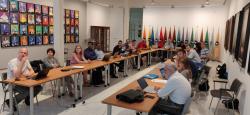On 12 and 13 September 2019, the Technical partners’ team and the Steering Committee of the Erasmus without Paper consortium met in Malaga to take stock of what had been done so far and to plan the activities until the end of the present project. It was the last live meeting of the project.
Progress reports were presented by all partners and special attention was given to security, more particularly to encryption procedures and authentication. In terms of timelines, it is clear that work by all technical partners will continue in 2020. The unique identification of HEIs e.g. by third-party providers was discussed in detail. Also, the integration of the Erasmus+ Dashboard was dealt with in detail. The Interinstitutional Agreement manager has now been integrated into the Dashboard by EWP and is ready for operation, but the OLA integration is somewhat delayed because of various technical issues for which standardized solutions are being worked out. Now that the European Commission has declared that the EWP standards will gradually become mandatory from 2021 onwards, the pressure is on HEIs to actually start implementing the necessary changes in their mobility management software that will enable them to use the EWP network. HEIs will be able to use different solutions for different parts of the mobility process (Institutional Factsheets, Interinstitutional Agreement, Nominations, Learning Agreements, Transcript of Records, …) but they will have to restrict themselves to just one solution for each step). Making sure that this is the case is not so easy in technical terms, however. The possibility of creating new functionalities and what will be the conditions for creating such new solutions were discussed, e.g. in terms of the HOME project that deals with accommodation info.
The role of EWP in the Commission’s European Student Card Initiative (of which EWP is part) was reviewed and the relationship with the other projects in it clarified (European Student Card, MyAcademicID, Erasmus+ App …). EWP hopes to become a digital ecosystem that will integrate/have links to all the projects above and more to come by 2020 when the European Digital Higher Education Area should be in place.
The Steering Committee discussed the outcomes of the technical meeting and took the necessary policy decisions for the EWP network as a whole and also the implications of GDPR. By the end of the year, all APIs will be turned into stable versions. Various testing tools will become available to the teams developing APIs and will be used by the EWP Network administrator for carrying out acceptance testing. The connection of the EWP network to the Mobility Tool+ servers is in full progress.
The EWP project will take an initiative to bring together DPOs (Data Protection Officers) from HEIs to see what are the exact implications of the data transfer envisaged through the EWP network. Also in terms of security, a peer-reviewed statement explaining the issues will be elaborated.
The status and further elaboration of the EWP Competence Centre was another major item on the agenda of the Steering Committee. By the end of the year, this reference website should be fully operational, even though it already contains a lot of info.
Finally, it has to be noted that there is a great interest from external third-party providers to connect their software to EWP: Terra Dotta, Osiris, Kion Turkey and Solemove. Users of this software (in addition to the present partners Mobility Online, USOS, MoveOn, FS and CINECA) will be able to connect to EWP as part of their user licence.

